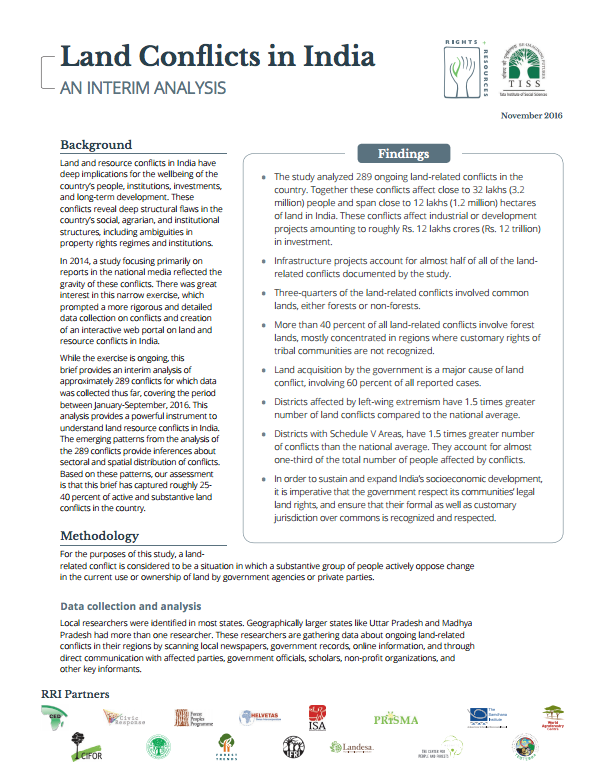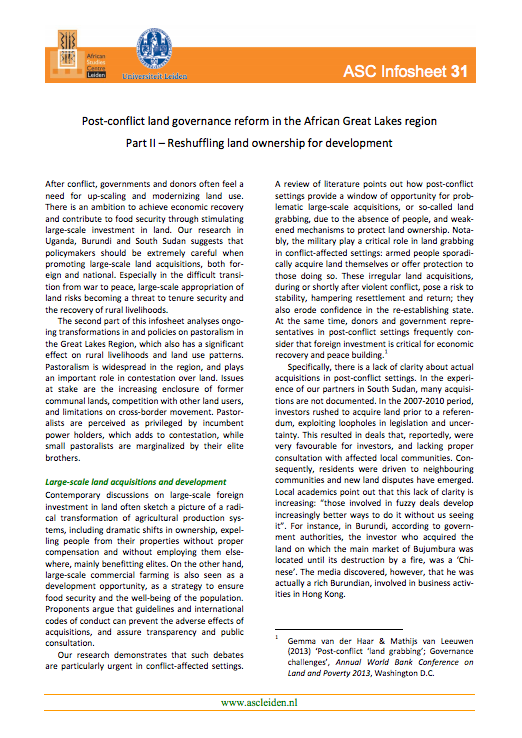Details
Location
Contributions
Displaying 1341 - 1350 of 2403Bharti Institute of Public Policy
One of the four institutes at ISB’s Mohali campus, the Bharti Institute of Public Policy is an independent think tank with its main objectives as follows: to promote high quality research to guide policy formulation and implementation in India; to train students – both through degree and short-term programs – to better appreciate, formulate and implement policies; as well as to engage with and inform policy formulation and implementation, particularly in developing country settings.
Land Conflicts in India: An Interim Analysis
Land and resource conflicts in India have deep implications for the well-being of the country’s people, institutions, investments, and long-term development. These conflicts reveal deep structural flaws in the country’s social, agrarian, and institutional structures, including ambiguities in property rights regimes and institutions. In 2014, a study focusing primarily on reports in the national media reflected the gravity of these conflicts.
Cambodian Office of the Council of Ministers
The Cabinet of Cambodia, formally known as the Council of Ministers (Khmer: គណៈរដ្ឋមន្ត្រី), is the executive body of the Kingdom of Cambodia led by the Prime Minister, assisted by Deputy Prime Ministers, Senior Ministers, Ministers, and Secretaries of State. Members of the Cabinet are nominated by the Prime Minister and appointed by the Monarch.
(Source: Wikipedia)
United States: Indigenous people treated like invaders
By: Mary and Jack Wichita, Mason, Wis.
Date: November 15th 2016
Source: Superior Telegram
We are compelled to share the issues that resonate with us about the current pipeline conflict in North Dakota.
Philippines: Farmers decry 'landgrabbing' in Mindanao
By: Angelo Caballero
Date: November 16th 2016
Source: ABS News
DAVAO CITY - Over 600 farmers staged a protest in front of Lapanday Foods Corporation office in Barangay Pampanga to voice out their struggles over land rights Wednesday.
The agrarian reform beneficiaries (ARBs), who came from different parts of Mindanao want Lapanday to grant them the "government-awarded land" for them to return to farming and earn a living.
Ethiopia: Rehabilitating Dry Lands Ensures Global Food Security - IFAD
By Desta Gebrehiwot
Date: November 15th 2016
Source: AllAfrica.com / The Ethiopian Herald
The United Nations International Fund for Agricultural Development (IFAD) stressed the need for rehabilitating dry lands in order to cope with the negative impacts of climate change, land degradation and drought.
Agriculture and food security at heart of climate change action
Date:November 16th 2016
Source: FAO Press Office
FAO unveils new global framework for action on water scarcity at COP22 summit
16 November 2016, Marrakech, Morocco-The world must rapidly move to scale up actions and ambitions on climate change FAO Director-General José Graziano da Silva told delegates at the United Nations Climate Change conference (COP22) in Morocco today.
Post-conflict land governance reform in the African Great Lakes region. Part III - Securing tenure of smallholder peasants
In post-conflict settings, securing tenure of local smallholders is considered of major importance to reduce and prevent local land disputes, to contribute to the recovery of rural livelihoods, and to improve agricultural production. Registration and other ways of formalizing land ownership are generally believed to significantly enhance local tenure security and rural development.
Post-conflict land governance reform in the African Great Lakes region. Part II - Reshuffling land ownership for development
After conflict, governments and donors often feel a need for up-scaling and modernizing land use. There is an ambition to achieve economic recovery and contribute to food security through stimulating large-scale investment in land. Our research in Uganda, Burundi and South Sudan suggests that policymakers should be extremely careful when promoting large-scale land acquisitions, both foreign and national. Especially in the difficult transition from war to peace, large-scale appropriation of land risks becoming a threat to tenure security and the recovery of rural livelihoods.
Post-conflict land governance reform in the African Great Lakes region. Part I - The challenges of post-conflict land reform
Disputes over land are a prominent feature of many situations of protracted violent conflict in Burundi, Uganda and South Sudan. Research conducted as part of the programme ‘Grounding Land Governance’ underscores that war reshuffles access and ownership, but also critically changes the ways in which land is governed. Land issues often come to resonate with other conflicts in society, thereby affecting overall stability. This makes interventions in land governance politically sensitive.











